from Apr. 15, 1919
54th Anniversary of Assasination
-
Full Title
Today Anniversary of Nation's Greatest Day of Mourning
-
Source
McLean County Museum of History
-
Rights
Creative Commons Attribution-NonCommercial-ShareAlike (CC-BY-NC-SA)
-
Tags
-
Cite this Item
The Pantagraph . "Today Anniversary of Nation's Greatest Day of Mourning". Remembering Lincoln. Web. Accessed October 29, 2025. https://rememberinglincoln.fords.org/node/710
from Apr. 15, 1919
Today Anniversary of Nation's Greatest Day of Mourning

-
Source
McLean County Museum of History
-
Rights
Creative Commons Attribution-NonCommercial-ShareAlike (CC-BY-NC-SA)
-
Creator
The Pantagraph
-
Date
April 15, 1919
from Mar. 23, 2015
The New York Herald, April 15, 1865
-
Full Title
The New York Herald, April 15, 1865
-
Description
On April 15, 1865, The New York Herald published seven editions about the assassination of President Abraham Lincoln, including this 10:00 a.m. edition. Details of the plot to assassinate the president emerged in this edition. Secretary of War Edwin Stanton reported the discovery of a letter in John Wilkes Booth’s room at the National Hotel containing details of the conspiracy and implicating accomplices. The borders of the 5th column have heavy black borders [known as mourning rules] to denote the tragic news of Lincoln's death.
-
Source
HN-1865-011077
-
Rights
Use of this item for research, teaching, and private study is permitted with proper citation and attribution as follows: Courtesy, Newseum Collection. Reproduction of this item for publication, broadcast, or commercial use requires written permission. For permission, please contact the Newseum.
-
Tags
-
Cite this Item
James Gordon Bennett. "The New York Herald, April 15, 1865". James Gordon Bennett. Remembering Lincoln. Web. Accessed October 29, 2025. https://rememberinglincoln.fords.org/node/697
from Mar. 23, 2015
The New York Herald, April 15, 1865
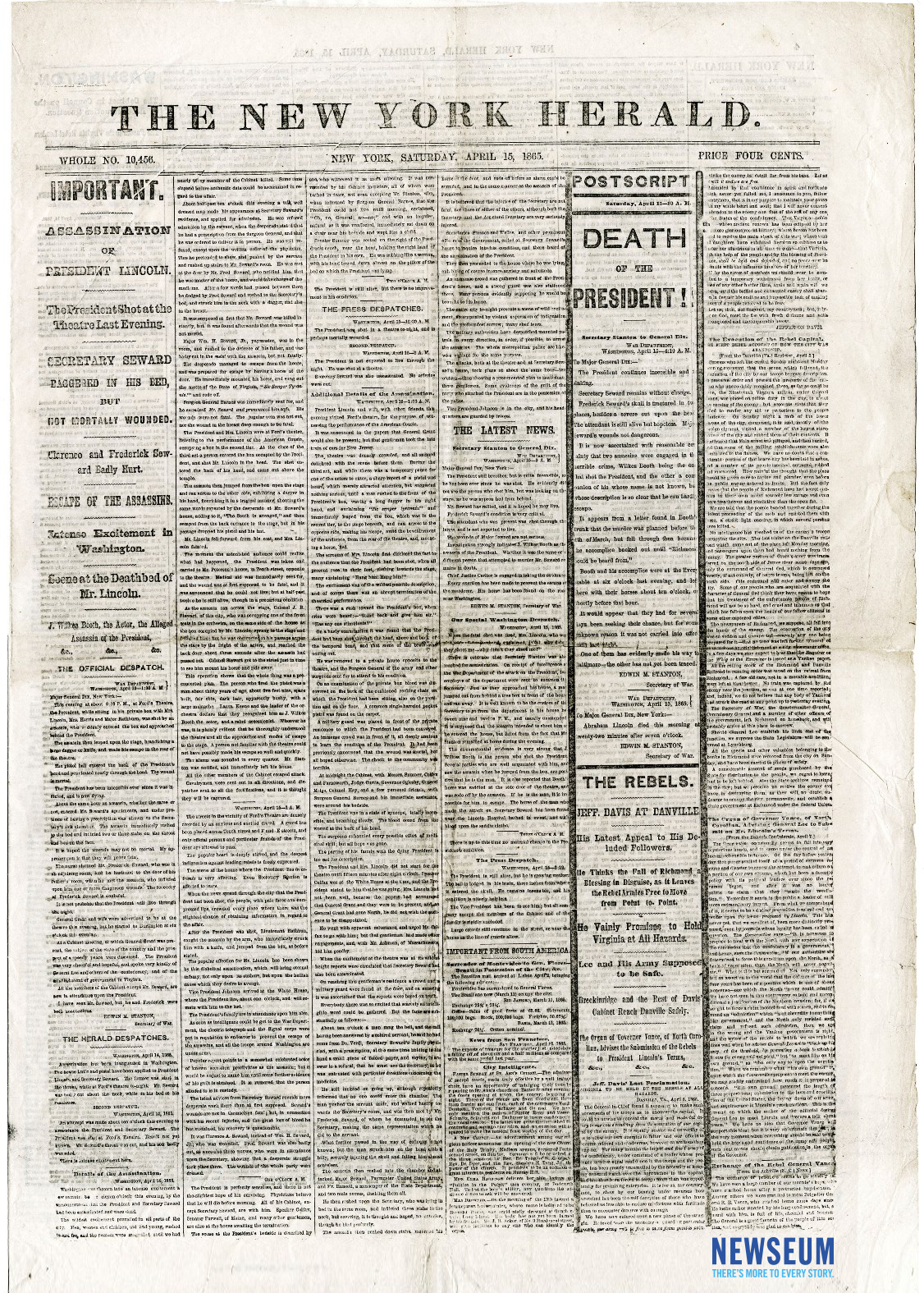
-
Description
On April 15, 1865, The New York Herald published seven editions about the assassination of President Abraham Lincoln, including this 10:00 a.m. edition. Details of the plot to assassinate the president emerged in this edition. Secretary of War Edwin Stanton reported the discovery of a letter in John Wilkes Booth’s room at the National Hotel containing details of the conspiracy and implicating accomplices. The borders of the 5th column have heavy black borders [known as mourning rules] to denote the tragic news of Lincoln's death.
-
Source
HN-1865-011077
-
Rights
Use of this item for research, teaching, and private study is permitted with proper citation and attribution as follows: Courtesy, Newseum Collection. Reproduction of this item for publication, broadcast, or commercial use requires written permission. For permission, please contact the Newseum.
-
Creator
James Gordon Bennett
-
Publisher
James Gordon Bennett
-
Date
March 23, 2015
from Apr. 17, 1865
The Morning Bulletin, April 17, [1865]
-
Full Title
The Morning Bulletin, April 17, [1865]
-
Description
The front page of this Union-occupation newspaper from Memphis, Tennessee provides details of the assassination of President Abraham Lincoln and the attempted assassination of Secretary William Henry Seward. Included are dispatches from Secretary of War Edwin M. Stanton to Major General John A. Dix. Additional articles report falsely on the death of Seward and the capture of John Wilkes Booth. Further reports detail Andrew Johnson‰Ûªs inauguration, the murder of an Illinois copperhead for rejoicing in Lincoln‰Ûªs assassination, the speeches of Maj. Gen. N.P. Banks and Lieut. Governor of Illinois William Bross, the search for the assassins, and a report that John Surratt is the suspected attacker of Seward. In the far right column is an editor bulletin. Known as "mourning rules," the wide vertical lines between the newspaper columns represent grief over the loss of an important person.
-
Source
HN-1865-011090
-
Rights
Use of this item for research, teaching, and private study is permitted with proper citation and attribution as follows: Courtesy, Newseum Collection. Reproduction of this item for publication, broadcast, or commercial use requires written permission. For permission, please contact the Newseum.
-
Tags
-
Cite this Item
James B. Bingham. "The Morning Bulletin, April 17, [1865]". James B. Bingham. Remembering Lincoln. Web. Accessed October 29, 2025. https://rememberinglincoln.fords.org/node/673
from Apr. 17, 1865
The Morning Bulletin, April 17, [1865]
![The Morning Bulletin, April 17, [1865]](https://rememberinglincoln.fords.org/sites/default/files/HN-1865-011090_wm.jpg)
-
Description
The front page of this Union-occupation newspaper from Memphis, Tennessee provides details of the assassination of President Abraham Lincoln and the attempted assassination of Secretary William Henry Seward. Included are dispatches from Secretary of War Edwin M. Stanton to Major General John A. Dix. Additional articles report falsely on the death of Seward and the capture of John Wilkes Booth. Further reports detail Andrew Johnson‰Ûªs inauguration, the murder of an Illinois copperhead for rejoicing in Lincoln‰Ûªs assassination, the speeches of Maj. Gen. N.P. Banks and Lieut. Governor of Illinois William Bross, the search for the assassins, and a report that John Surratt is the suspected attacker of Seward. In the far right column is an editor bulletin. Known as "mourning rules," the wide vertical lines between the newspaper columns represent grief over the loss of an important person.
-
Source
HN-1865-011090
-
Rights
Use of this item for research, teaching, and private study is permitted with proper citation and attribution as follows: Courtesy, Newseum Collection. Reproduction of this item for publication, broadcast, or commercial use requires written permission. For permission, please contact the Newseum.
-
Creator
James B. Bingham
-
Publisher
James B. Bingham
-
Date
April 17, 1865
-
Material
Newspaper
from Apr. 15, 1865
[Chattanooga Daily] Gazette Extra, April 15, [1865]
-
Full Title
[Chattanooga Daily] Gazette Extra, April 15, [1865]
-
Description
Broadside extra of Union-occupation newspaper providing details of the assassination of President Abraham Lincoln and the attempted assassination of Secretary William Henry Seward. Included are dispatches from Secretary of War Edwin M. Stanton to Major General John A. Dix, and a 2:00 pm report on the swearing-in of Andrew Johnson. Known as "mourning rules," the wide vertical lines between the newspaper columns represent grief over the loss of an important person.
-
Source
HN-1865-012220
-
Rights
Use of this item for research, teaching, and private study is permitted with proper citation and attribution as follows: Courtesy, Newseum Collection. Reproduction of this item for publication, broadcast, or commercial use requires written permission. For permission, please contact the Newseum.
-
Tags
-
Cite this Item
James R. Hood. "[Chattanooga Daily] Gazette Extra, April 15, [1865]". James R. Hood. Remembering Lincoln. Web. Accessed October 29, 2025. https://rememberinglincoln.fords.org/node/672
from Apr. 15, 1865
[Chattanooga Daily] Gazette Extra, April 15, [1865]
![[Chattanooga Daily] Gazette Extra, April 15, [1865]](https://rememberinglincoln.fords.org/sites/default/files/HN-1865-012220_wm.jpg)
-
Description
Broadside extra of Union-occupation newspaper providing details of the assassination of President Abraham Lincoln and the attempted assassination of Secretary William Henry Seward. Included are dispatches from Secretary of War Edwin M. Stanton to Major General John A. Dix, and a 2:00 pm report on the swearing-in of Andrew Johnson. Known as "mourning rules," the wide vertical lines between the newspaper columns represent grief over the loss of an important person.
-
Source
HN-1865-012220
-
Rights
Use of this item for research, teaching, and private study is permitted with proper citation and attribution as follows: Courtesy, Newseum Collection. Reproduction of this item for publication, broadcast, or commercial use requires written permission. For permission, please contact the Newseum.
-
Creator
James R. Hood
-
Publisher
James R. Hood
-
Date
April 15, 1865
-
Material
Newspaper
from Apr. 29, 1865
The New South, April 29, 1865
-
Full Title
The New South, April 29, 1865
-
Description
The front page of this Union-occupation newspaper provides brief details on the funeral of President Abraham Lincoln in Washington, DC. Additionally, there is a War Department dispatch from Secretary of War Edwin M. Stanton to Major General John A. Dix regarding the route of the funeral train from DC to Springfield, Illinois. The next paragraph indicates Willie Lincoln will be interred with his father. There are further biographical articles on both Abraham Lincoln and President Andrew Johnson on the front page.
-
Source
HN-1865-011149
-
Rights
Use of this item for research, teaching, and private study is permitted with proper citation and attribution as follows: Courtesy, Newseum Collection. Reproduction of this item for publication, broadcast, or commercial use requires written permission. For permission, please contact the Newseum.
-
Tags
-
Cite this Item
J. H. Sears. "The New South, April 29, 1865". J. H. Sears. Remembering Lincoln. Web. Accessed October 29, 2025. https://rememberinglincoln.fords.org/node/670
from Apr. 29, 1865
The New South, April 29, 1865

-
Description
The front page of this Union-occupation newspaper provides brief details on the funeral of President Abraham Lincoln in Washington, DC. Additionally, there is a War Department dispatch from Secretary of War Edwin M. Stanton to Major General John A. Dix regarding the route of the funeral train from DC to Springfield, Illinois. The next paragraph indicates Willie Lincoln will be interred with his father. There are further biographical articles on both Abraham Lincoln and President Andrew Johnson on the front page.
-
Source
HN-1865-011149
-
Rights
Use of this item for research, teaching, and private study is permitted with proper citation and attribution as follows: Courtesy, Newseum Collection. Reproduction of this item for publication, broadcast, or commercial use requires written permission. For permission, please contact the Newseum.
-
Creator
J. H. Sears
-
Publisher
J. H. Sears
-
Date
April 29, 1865
-
Material
Newspaper
from Apr. 20, 1865
Charleston Courier, April 20, 1865
-
Full Title
Charleston Courier, April 20, 1865
-
Description
The front page of this Union-occupation newspaper from South Carolina provides details of the assassination of President Abraham Lincoln and the attempted assassination of Secretary William Henry Seward. The Courier received this information via the steamer Fulton which arrived at Hilton Head on April 18, carrying New York newspapers of April 15. Included are dispatches from Secretary of War Edwin M. Stanton to Major General John A. Dix and a special dispatch to the New York Times. Known as "mourning rules," the wide vertical lines between the newspaper columns represent grief over the loss of an important person.
-
Source
HN-1865-011099
-
Rights
Use of this item for research, teaching, and private study is permitted with proper citation and attribution as follows: Courtesy, Newseum Collection. Reproduction of this item for publication, broadcast, or commercial use requires written permission. For permission, please contact the Newseum.
-
Tags
-
Cite this Item
Whittemore & Johnson. "Charleston Courier, April 20, 1865". Whittemore & Johnson. Remembering Lincoln. Web. Accessed October 29, 2025. https://rememberinglincoln.fords.org/node/664
from Apr. 20, 1865
Charleston Courier, April 20, 1865

-
Description
The front page of this Union-occupation newspaper from South Carolina provides details of the assassination of President Abraham Lincoln and the attempted assassination of Secretary William Henry Seward. The Courier received this information via the steamer Fulton which arrived at Hilton Head on April 18, carrying New York newspapers of April 15. Included are dispatches from Secretary of War Edwin M. Stanton to Major General John A. Dix and a special dispatch to the New York Times. Known as "mourning rules," the wide vertical lines between the newspaper columns represent grief over the loss of an important person.
-
Source
HN-1865-011099
-
Rights
Use of this item for research, teaching, and private study is permitted with proper citation and attribution as follows: Courtesy, Newseum Collection. Reproduction of this item for publication, broadcast, or commercial use requires written permission. For permission, please contact the Newseum.
-
Creator
Whittemore & Johnson
-
Publisher
Whittemore & Johnson
-
Date
April 20, 1865
-
Material
Newspaper
from Apr. 16, 1865
The New York Herald, April 16, 1865
-
Full Title
The New York Herald, April 16, 1865
-
Description
The front page of The New York Herald features nearly an entire column of bold headlines on the assassination of President Abraham Lincoln and the attempted assassination of Secretary William Henry Seward. The newspaper prints the dispatches from Secretary of War Edwin M. Stanton to Major General John A. Dix, the statement of witness Clara Harris, physician's notes on Lincoln's failing condition, public reaction to Lincoln's death, the search for the assassins, and the inauguration of Andrew Johnson. Known as "mourning rules," the wide vertical lines between the newspaper columns represent grief over the loss of an important person.
-
Source
HN-1865-011086
-
Rights
Use of this item for research, teaching, and private study is permitted with proper citation and attribution as follows: Courtesy, Newseum Collection. Reproduction of this item for publication, broadcast, or commercial use requires written permission. For permission, please contact the Newseum.
-
Tags
-
Cite this Item
James Gordon Bennett. "The New York Herald, April 16, 1865". James Gordon Bennett. Remembering Lincoln. Web. Accessed October 29, 2025. https://rememberinglincoln.fords.org/node/633
from Apr. 16, 1865
The New York Herald, April 16, 1865
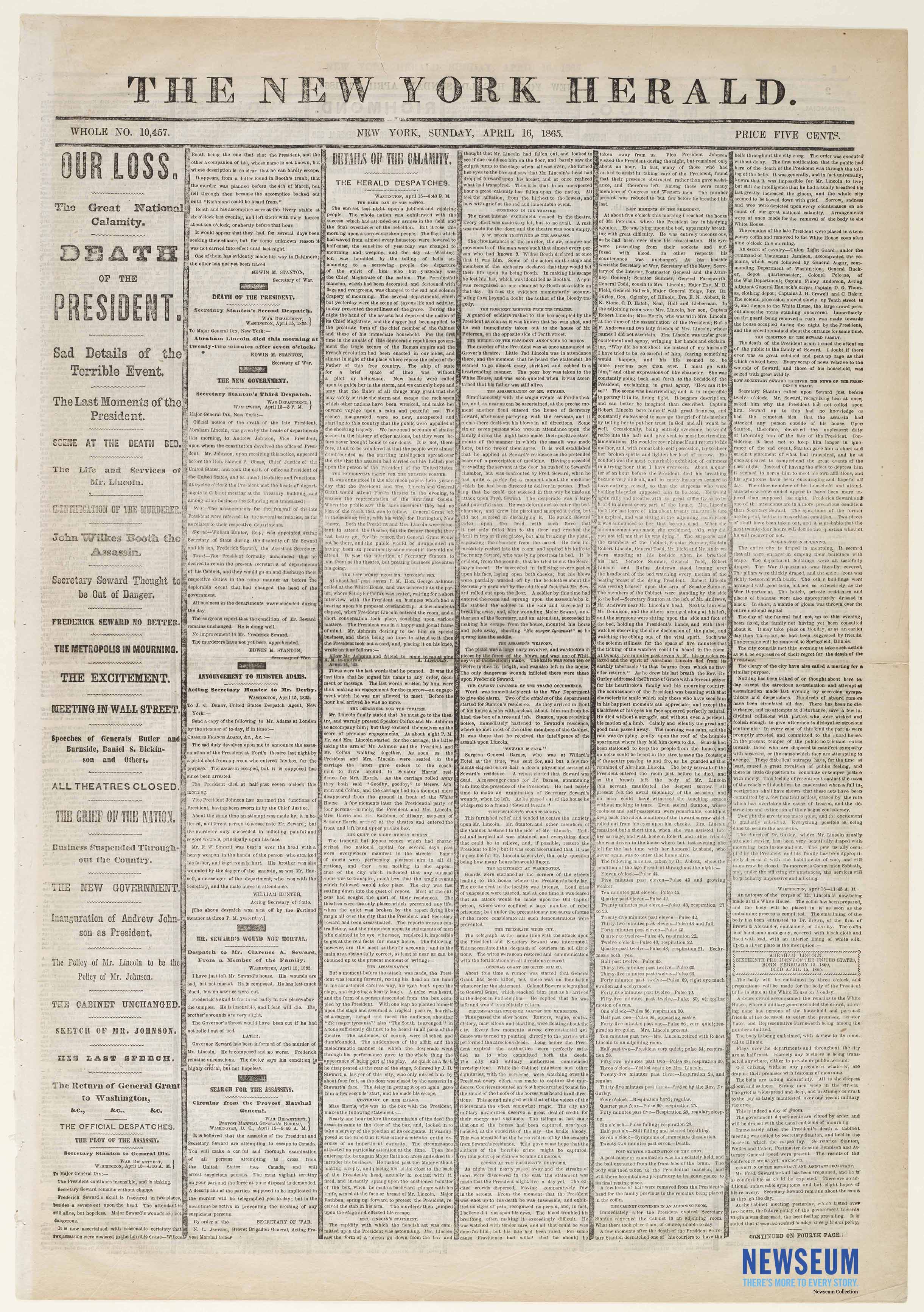
-
Description
The front page of The New York Herald features nearly an entire column of bold headlines on the assassination of President Abraham Lincoln and the attempted assassination of Secretary William Henry Seward. The newspaper prints the dispatches from Secretary of War Edwin M. Stanton to Major General John A. Dix, the statement of witness Clara Harris, physician's notes on Lincoln's failing condition, public reaction to Lincoln's death, the search for the assassins, and the inauguration of Andrew Johnson. Known as "mourning rules," the wide vertical lines between the newspaper columns represent grief over the loss of an important person.
-
Source
HN-1865-011086
-
Rights
Use of this item for research, teaching, and private study is permitted with proper citation and attribution as follows: Courtesy, Newseum Collection. Reproduction of this item for publication, broadcast, or commercial use requires written permission. For permission, please contact the Newseum.
-
Creator
James Gordon Bennett
-
Publisher
James Gordon Bennett
-
Date
April 16, 1865
-
Material
Newspaper
from Apr. 19, 1865
The Daily Progress, April 19, 1865
-
Full Title
The Daily Progress, April 19, 1865
-
Description
The Daily Progress was published in Raleigh, North Carolina, which was occupied by the Union Army at the time this issue was printed. An interior page contains an editorial titled "A National Calamity - the Assassination of President Lincoln" which laments the death of President Abraham Lincoln and encourages citizens of North Carolina to pledge their allegiance to the Union. The paper also prints a dispatch from Secretary of War Edwin M. Stanton to Major General W.T. Sherman relaying the news of Lincoln's death, as well as Sherman's Special Field Order No. 50 relaying the same. Known as "mourning rules," the wide vertical lines between the newspaper columns represent grief over the loss of an important person.
-
Source
HN-1865-011098B
-
Rights
Use of this item for research, teaching, and private study is permitted with proper citation and attribution as follows: Courtesy, Newseum Collection. Reproduction of this item for publication, broadcast, or commercial use requires written permission. For permission, please contact the Newseum.
-
Tags
-
Cite this Item
J.L. Pennington & Co.. "The Daily Progress, April 19, 1865". . Remembering Lincoln. Web. Accessed October 29, 2025. https://rememberinglincoln.fords.org/node/632
from Apr. 19, 1865
The Daily Progress, April 19, 1865
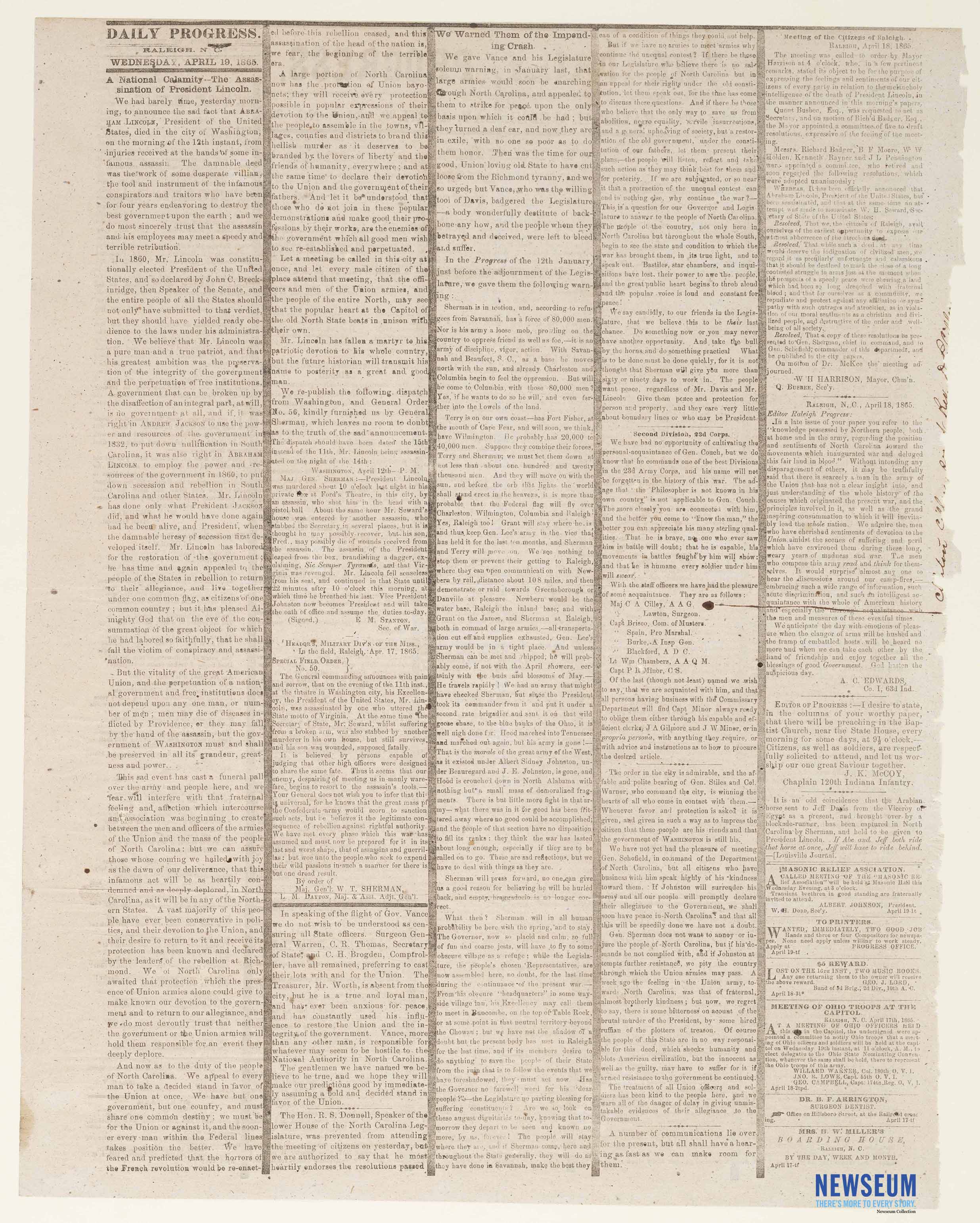
-
Description
The Daily Progress was published in Raleigh, North Carolina, which was occupied by the Union Army at the time this issue was printed. An interior page contains an editorial titled "A National Calamity - the Assassination of President Lincoln" which laments the death of President Abraham Lincoln and encourages citizens of North Carolina to pledge their allegiance to the Union. The paper also prints a dispatch from Secretary of War Edwin M. Stanton to Major General W.T. Sherman relaying the news of Lincoln's death, as well as Sherman's Special Field Order No. 50 relaying the same. Known as "mourning rules," the wide vertical lines between the newspaper columns represent grief over the loss of an important person.
-
Source
HN-1865-011098B
-
Rights
Use of this item for research, teaching, and private study is permitted with proper citation and attribution as follows: Courtesy, Newseum Collection. Reproduction of this item for publication, broadcast, or commercial use requires written permission. For permission, please contact the Newseum.
-
Creator
J.L. Pennington & Co.
-
Publisher
-
Date
April 19, 1865
-
Material
Newspaper
from Apr. 15, 1865
Baltimore Clipper, April 15, 1865
-
Full Title
Baltimore Clipper, April 15, 1865
-
Description
The Baltimore Clipper newspaper provides extensive details on the assassination of President Abraham Lincoln and the attempted assassination of Secretary William Henry Seward. It contains numerous official dispatches from Secretary of War Edwin M. Stanton to Major General John A. Dix about Lincoln's condition. Known as "mourning rules," the wide vertical lines between the newspaper columns represent grief over the loss of an important person.
-
Source
HN-1865-011058
-
Rights
Use of this item for research, teaching, and private study is permitted with proper citation and attribution as follows: Courtesy, Newseum Collection. Reproduction of this item for publication, broadcast, or commercial use requires written permission. For permission, please contact the Newseum.
-
Tags
-
Cite this Item
Bull & Tuttle. "Baltimore Clipper, April 15, 1865". Bull & Tuttle. Remembering Lincoln. Web. Accessed October 29, 2025. https://rememberinglincoln.fords.org/node/631
from Apr. 15, 1865
Baltimore Clipper, April 15, 1865
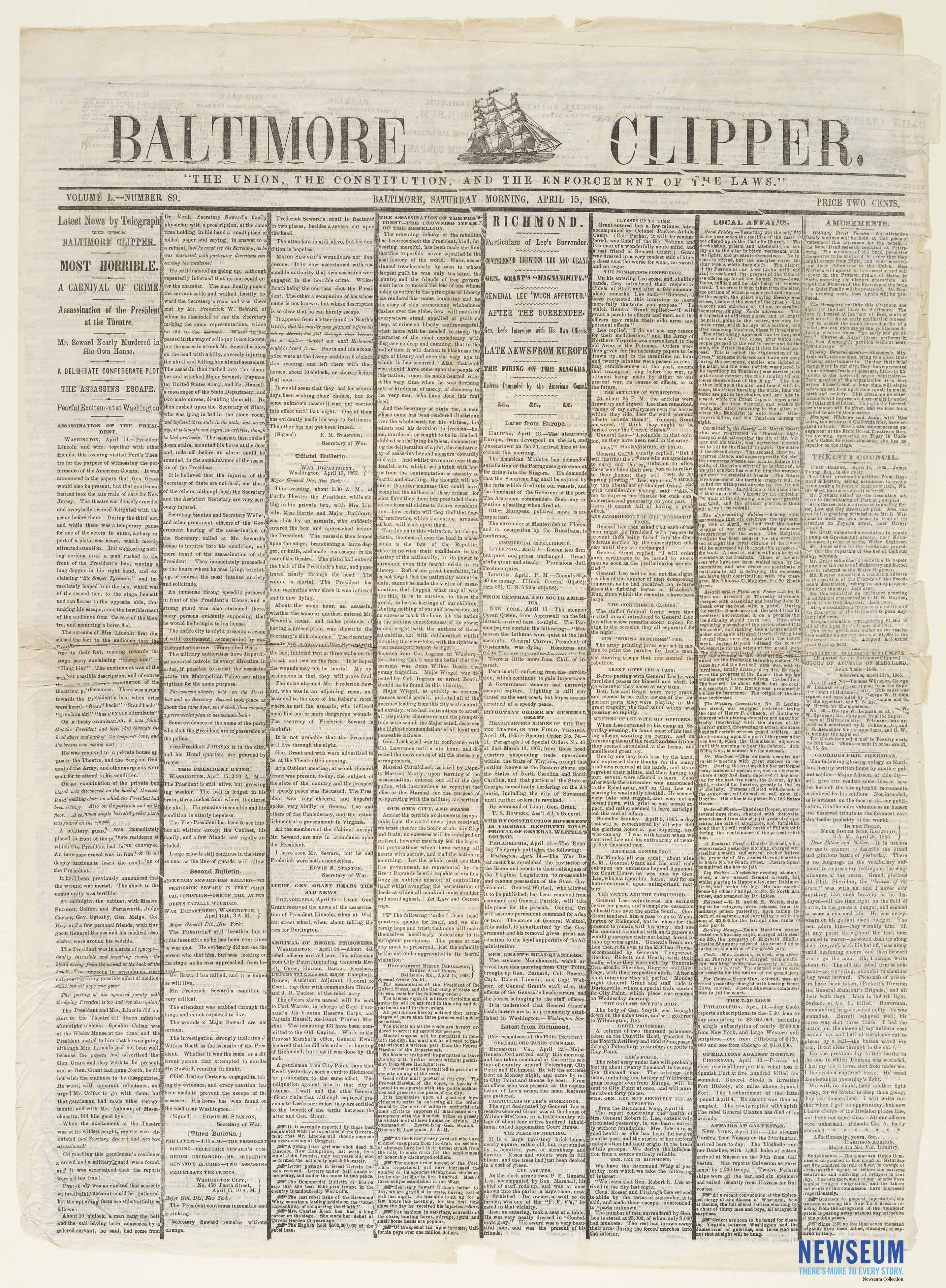
-
Description
The Baltimore Clipper newspaper provides extensive details on the assassination of President Abraham Lincoln and the attempted assassination of Secretary William Henry Seward. It contains numerous official dispatches from Secretary of War Edwin M. Stanton to Major General John A. Dix about Lincoln's condition. Known as "mourning rules," the wide vertical lines between the newspaper columns represent grief over the loss of an important person.
-
Source
HN-1865-011058
-
Rights
Use of this item for research, teaching, and private study is permitted with proper citation and attribution as follows: Courtesy, Newseum Collection. Reproduction of this item for publication, broadcast, or commercial use requires written permission. For permission, please contact the Newseum.
-
Creator
Bull & Tuttle
-
Publisher
Bull & Tuttle
-
Date
April 15, 1865
-
Material
Newspaper
from Apr. 21, 1865
The Liberator, April 21, 1865
-
Full Title
The Liberator, April 21, 1865
-
Description
William Lloyd Garrison's abolitionist newspaper provides extensive details on the assassination of President Abraham Lincoln and the attempted assassination of Secretary William Henry Seward. It contains the 1:30 a.m. official dispatch from Secretary of War Edwin M. Stanton to Major General John A. Dix, as well as the 8:00 a.m. dispatch reporting Lincoln's death. Known as "mourning rules," the wide vertical lines between the newspaper columns represent grief over the loss of an important person.
-
Source
HN-1865-011108B
-
Rights
Use of this item for research, teaching, and private study is permitted with proper citation and attribution as follows: Courtesy, Newseum Collection. Reproduction of this item for publication, broadcast, or commercial use requires written permission. For permission, please contact us at artifacts@newseum.org.
-
Tags
-
Cite this Item
Wm. Lloyd Garrison. "The Liberator, April 21, 1865". Wm. Lloyd Garrison. Remembering Lincoln. Web. Accessed October 29, 2025. https://rememberinglincoln.fords.org/node/630
from Apr. 21, 1865
The Liberator, April 21, 1865
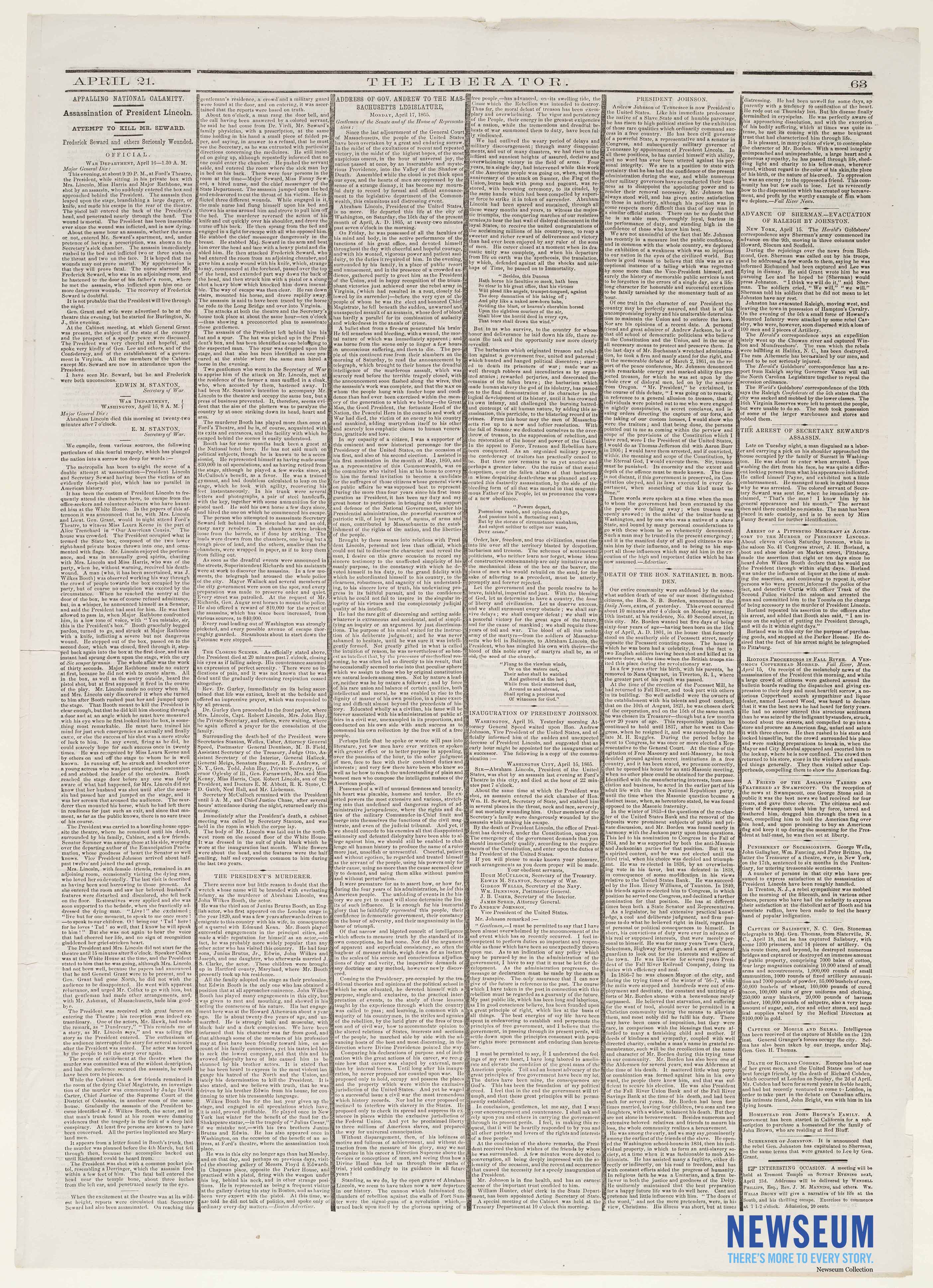
-
Description
William Lloyd Garrison's abolitionist newspaper provides extensive details on the assassination of President Abraham Lincoln and the attempted assassination of Secretary William Henry Seward. It contains the 1:30 a.m. official dispatch from Secretary of War Edwin M. Stanton to Major General John A. Dix, as well as the 8:00 a.m. dispatch reporting Lincoln's death. Known as "mourning rules," the wide vertical lines between the newspaper columns represent grief over the loss of an important person.
-
Source
HN-1865-011108B
-
Rights
Use of this item for research, teaching, and private study is permitted with proper citation and attribution as follows: Courtesy, Newseum Collection. Reproduction of this item for publication, broadcast, or commercial use requires written permission. For permission, please contact us at artifacts@newseum.org.
-
Creator
Wm. Lloyd Garrison
-
Publisher
Wm. Lloyd Garrison
-
Date
April 21, 1865
-
Material
Newspaper

